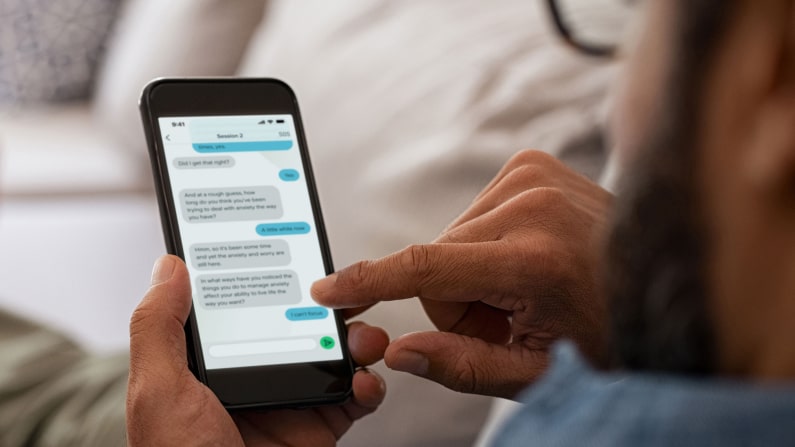
ieso Case Study: South West London and St George's Mental Health NHS Trust
Summary
South West London and St George's Mental Health NHS Trust (SWLSTG) serves 1.1 million people across the London boroughs of Kingston, Merton, Richmond, Sutton, and Wandsworth and employs more than 2,000 staff who provide care and treatment to about 20,000 people from South West London and beyond at any given moment. They have a long history of innovation that has helped to redefine the mental health landscape in the UK.
To manage capacity against access, SWLSTG commissioned ieso to relieve waiting lists through additional capacity, expanding access by increasing patient choice, and out-of-hours provision. ieso also provided direct marketing to increase awareness of the self-referral pathway.
To manage capacity against access, SWLStG commissioned ieso to relieve waiting lists through additional capacity
Challenges faced by SWLStG
Waiting lists at SWLSTG for Talking Therapies were becoming hard to manage. Extra capacity was required, especially during out-of-hours and so they looked for an innovative way to solve this, by commissioning ieso’s online typed therapy service. They had also identified a need for alternative ways to access hard-to-reach populations in need of mental health treatment.
Initial apprehensions around typed therapy
Dr Yvonne Hemmings, Consultant Clinical Psychologist, Head of Psychology and Psychotherapies, Talking Therapies and Primary Care at SWLStG explained that as clinicians, her and her colleagues were initially apprehensive about online typed therapy – specifically, the quality of care delivered through the modality, and also, how patients would react to it: “Whenever you commission a new service to support you clinically, there are always apprehensions around the clinical quality of what can be delivered. You’re also concerned about whether patients want it, and will it work okay for them?”
However, ieso's network of BABCP-accredited clinicians have been helping people with their mental health through confidential, one-to-one, typed conversations for over a decade, treating over 120,000 NHS patients during that time. With research having shown that typed therapy is as effective as face-to-face therapy, and our patients telling us typed therapy makes it easier to open up and reflect on their thoughts and behaviours than if they were sat in front of a therapist, SWLTStG felt confident in commissioning with ieso.
With research having shown that typed therapy is as effective as face-to-face therapy

How ieso addressed SWLStG’s needs
ieso was commissioned to address SWLStG’s needs in the below two ways, each with their corresponding outcomes:
Capacity
Assisting with managing capacity against access, and maximising out-of-hours provision, through our affiliate clinician network.
ieso has an affiliate network of over 600 BABCP clinicians, who achieve above-average recovery rates in fewer sessions than the NHS average. This is made possible through ieso’s Therapy Insights Model (TIM), an AI-powered tool that measures patient outcomes to discover what works in therapy, revealing specific insights which are presented to the clinicians so they can reflect on and improve their practice. ieso’s online typed therapy service is available through self-referral, with waits to enter treatment being as little as three weeks, and also via the local Talking Therapies Services in Wandsworth, Merton and Sutton.
60% of ieso appointments take place outside of working hours, meaning ieso was able to help provide a wide range of appointment times for SWLStG. A significant proportion of ieso’s network of affiliate clinicians offer out-of-hours provision, due to the size of the network and our flexible working arrangements.
Outcome
ieso’s offer of out-of-hours capacity meant SWLStG’s staff were not stretched with having to work overtime and unsociable hours, meaning they could focus on reducing their internal waiting lists. It also had the unexpected benefit of improving their staff retention rates, as staff weren’t getting burnt out from long hours and leaving. This avoided staff turnover which would have taken time, and in turn made waiting lists longer – Dr Yvonne Hemmings explained: “One of the retention issues we were having just after the pandemic was caused by the fact that our staff were required to work a certain number of evenings per week, and were also supposed to be working Friday and Saturday nights on a rota to make sure that we had a good spread of appointments. ieso’s accessibility along with the accessibility of some of our subcontracted partners has meant that we've been able to scale back the requirement for out-of-hours working for our staff, which has in turn improved our retention. That was really important. I think we'd have struggled to have scaled that back and still meet our contractual obligations about opening hours without that support, so that’s been very helpful.”
Access via self-referral marketing
Marketed direct self-referral into the ieso service to target those who would not or could not access traditional therapy.
ieso marketing supported SWLStG with access targets by helping to raise awareness of the typed therapy service available to patients across Wandsworth, Merton, and Sutton through targeted campaigns. We worked closely with the team to understand their requirements and pain points and created targeted self-referral marketing strategies across the three areas.
Outcome
From September 2021 to May 2022, 133 patients entered treatment via direct self-referral, but by comparison from June 2022 to March 2023 when ieso marketing was activated, 713 patients entered treatment through the dedicated ieso self-referral landing page, demonstrating a 436% uplift. Self-referral bypasses the need to see a GP, so these patients didn’t land on SWLStG’s internal waiting list at any point, providing important additional capacity.
Dr Yvonne Hemmings, “Direct self-referral was probably the most impactful. It's difficult to check out for definite, but we have an assumption that there are people who maybe feel more able to access the service that way, because they never have to talk to anyone directly if they don't want to. So, we think the direct self-referral has helped us to access a different group of people.”
“When we turned on online marketing, we had a big spike and when we turned it off it dropped! The problem with having to turn it on and off, as we had to for budgetary reasons, is you can't build any momentum, which is a problem, because it makes it difficult to create good arguments for it because it looks patchy, but of course that was related to the fact that we couldn't get a bit more momentum going with it, when in practice we'd be very happy to do more. I don't think we've reached the ceiling of what we could do with you.”
Direct self-referral was probably the most impactful. It’s difficult to check out for definite, but we have an assumption that there are people who maybe feel more able to access the service that way, because they never have to talk to anyone directly if they don’t want to. So, we think the direct self-referral has helped us to access a different group of people.
- Dr Yvonne Hemmings
.jpg)
Building a strong partnership between ieso and SWLStG
ieso always seeks to build strong, collaborative relationships with our partners, by always taking care to get to know each other and adapt the services we provide to their specific needs.
Dr Yvonne Hemmings described the initial stages of the partnership between ieso and SWLStG: “Due diligence always takes time, but it was smooth, and generally we felt like we could ask ieso to take the lead on quite a few things which meant that we didn't have to throw lots of resources at it ourselves. It was then just going through it and spotting things that might be missing, but broadly that was OK.
So, to get that as streamlined as we could with ieso took a bit of time, but also actually ieso have been really flexible about trying to learn about local variation and supporting where they can too”
Due diligence always takes time, but it was smooth, and generally we felt like we could ask ieso to take the lead on quite a few things which meant that we didn’t have to throw lots of resources at it ourselves. It was then just going through it and spotting things that might be missing, but broadly that was OK.
- Dr Yvonne Hemmings
Dr Yvonne Hemmings also stressed the importance of taking time to train their staff to maximise the benefits that partnering ieso can provide: “We noticed during training that many clinicians would make assumptions about who would and wouldn’t benefit from typed therapy, so it shouldn’t be offered to certain people, but people are generally pretty open-minded - if people on the front line understand it and talk about it energetically it will encourage people to use it. So, we make sure we train twice a year now to keep up with new recruits, providing outcomes and feedback on their decisions to use ieso, to help them make better decisions.”
It is also important to us that we are upfront with which of the services we provide to our partners we believe will work best for them, and which ones may not be appropriate – on this Dr Yvonne Hemmings also added:
“The other thing that I really appreciate, is how honest you've been with us. For example, we asked about whether you could replicate the design and offering of capacity for video calls, and we did a bit of project work and we got that quite far, but then you came back and said that you didn't think you’d have the capacity at that time. That was so helpful for us because otherwise we’d have pinned our hopes on something that could have been a massive disaster and ended up with a massive backlog of patients.
I think you have always been really very honest and that makes our life a million times easier because we can actually plan our capacity properly, so we’re really glad for the lack of spin and that you’re just straightforward.
You have really good processes for being able to forecast, and that's very clearly not present in some other companies doing a similar thing to you. It’s really obvious to us that you make pretty accurate predictions.”
The other thing that I really appreciate, is how honest you’ve been with us. For example, we asked about whether you could replicate the design and offering of capacity for video calls, and we did a bit of project work and we got that quite far, but then you came back and said that you didn’t think you’d have the capacity at that time.
- Dr Yvonne Hemmings
In addition to clinical outcomes, Liz Cooke, SWLStG Operational Lead also added this on the operational side of working with ieso: “From an operational perspective, ieso are really great to work with. It's a very smooth process, with really good working relationships. The review meetings run very smoothly; we don't have any issues at all. In fact, they're probably our favourite partner that we work with, because everything is just so easy. They're great to work with.”
Key takeaways
- It is important when offering relatively new forms of treatment such as online CBT that staff are aware of how and why it works, and that patients are aware of how it works and that it is available.
- Clinicians have presumptions and misconceptions about who ieso will and won’t work for – despite this not actually being easy to predict. Training can be important so clinicians understand how and why ieso works, and that it is not always obvious which populations will get the most benefit from the service.
- Relieving pressure on your existing staff to work out-of-hours can aid staff retention rates.
- Direct self-referral can access hard-to-reach populations who wouldn’t otherwise come forward for treatment.
- ieso’s direct marketing works to increase self-referral uptake when it is activated – but is more effective when campaigns are run continuously.

About South West London and St George's Mental Health NHS Trust:
South West London and St George's Mental Health NHS Trust serves 1.1 million people across the London boroughs of Kingston, Merton, Richmond, Sutton, and Wandsworth and employs more than 2,000 staff who provide care and treatment to about 20,000 people from southwest London and beyond at any given moment.
They have a long history of innovation that has helped to redefine the mental health landscape in the UK. They have more than 100 clinical teams across the Trust, working to make sure that high-quality patient-centered care is their key priority. The emphasis of their services is on recovery which means helping people to get on with their lives and to focus on the things that are important to them.
They provide community and outpatient services in each of the boroughs they serve, and their staff are among some of the most advanced and experienced practitioners in their fields and are proud of the positive impact their mental health services have for both patients and the wider community. They invest in research, innovation and training in mental health and are connected to a number of academic and research organisations.
Their clinical expertise has led them to develop and contribute to ground-breaking national policies. They also regularly receive visitors to transfer knowledge and share good practice.
.png)
About ieso
By working with over half of all NHS ICBs, ieso is already one of the UK’s most trusted online therapy providers.
With our sessions being typed or taking place over video, and available around the clock, we’re able to reach patients like never before. Patients get better access to mental healthcare that is just as effective as face-to-face therapy, while evidence-based insights are gained through analysis of deidentified treatment data.
Our learnings are not only shared with our network of fully qualified clinicians to improve our existing service, but they also enable academic research, and the creation of novel digital products to help get patients better, faster.
Find out more about ieso.
For more information email:
talkingtherapies@iesohealth.com

.png)